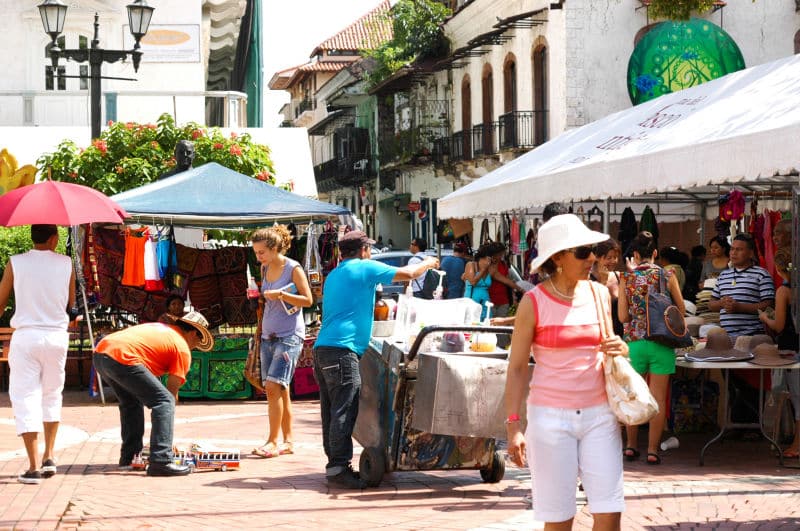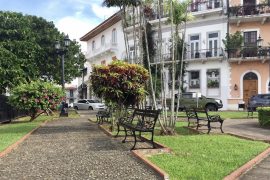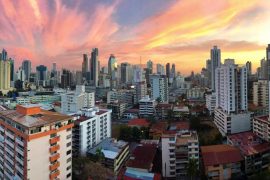What is the difference between being an expat or immigrant? That question, recently touched on by Mawuna Remarque Koutonin in The Guardian, captivated my international friends and me. We weren’t alone in our discussion either—the article has seen close to half a million shares online.
In the article, Koutonin argues that “expat” is a word “reserved exclusively for western white people going to work abroad.”
Koutonin misses the mark on who receives the privilege of being referred to as an expat instead of an immigrant. While he is right in saying that expats receive additional privileges and normally come from the Western world, he is wrong in his claim that they must necessarily be white and working.
Specifically, here in Panama, many expats are neither white nor working. Almost all Americans I’ve met here call themselves expats, regardless of their skin color (and the same goes for people from other Western countries). Being white isn’t an automatic pass for being an expat either. I know of a white Eastern European fellow who claims he feels like and considers himself to be an immigrant, not an expat. His story of leaving his home country and arriving in Panama sounded difficult and fairly dangerous—unlike those of any expats either he or I knew of, but all too similar to that of many immigrants.
As far as Koiutonin’s claim that expats are only those who work, he is wrong again. A large portion of expats in Panama and around the world are retired. Less economically developed countries are simply more affordable to settle down in for middle- and lower-income retirees from higher-income countries. And it is a growing trend; in March, the U.S. Social Security Administration mailed 619,603 recipient checks outside of the United States, up almost 5,000 from the month before.
Without mention of nationality, skin color, or employment status, Merriam-Webster dictionary defines an “immigrant” as “a person who comes to a country to live there” and “expatriating” as “to leave one’s native country to live elsewhere.” Aside from the problem of comparing a noun to a verb, it appears that the words expat and immigrant are synonymous. To expatriate from your country is to immigrate to another, and to immigrate to a country is to expatriate from your homeland.
While the elementary definitions may be synonymous, the common usages of the two words certainly are not. Koutonin identifies that the major difference in how people identify as either expat or immigrant has much to do with stigmas surrounding immigrants. Oddly, many self-identified expats hold often racist, anti-immigrant views, especially in regard to immigration in their home country.
An older “expat” I know decided to leave the southwestern United States because, according to him, Mexicans were stealing jobs and ruining his traditional white-picket-fence community (while actually, they were destroying the fantasy of it that existed in his mind). The hypocrisy of his decision was lost on him. If I were to have told him that the United States was essentially founded by and for immigrants, his head would have exploded. How easily people forget that the U.S. Founding Fathers were in fact immigrants (and rather wealthy ones, whom would certainly be referred to as expats today).
There shouldn’t be anything wrong with being called an immigrant. Immigrants are not a scourge on society, and they often contribute more than their fair share to their new country’s economy. Immigration helps to form cross-cultural bonds that promote peace and understanding and discourage war and confrontation. Unfortunately, these observations are often drowned out by jingoistic shouts of “Illegals go home!” or “They took our jobs!” As if it is even possible for a person’s being to be illegal, or a job to be owned.
[adrotate group=”11″]
Having read many of the responses to Koutonin’s widely shared article, I was disappointed in the responses from self-identified expat commentators and writers—all Western, mostly white. For the most part, they went on trying to defend why they were indeed not immigrants, and that they were truly expats. Many of the constructed differences between expat and immigrant were logically flawed and focused on definitions far outside common parlance. Apparently, some expats just really don’t want to be called immigrants.
How should we deal with the stereotypes and labels that allow some to enjoy the benefits of being expats while others suffer the stigma of being immigrants? If the two words are synonymous, then those referring to themselves as expats aren’t necessarily wrong. Though, they would be wrong if they denied the fact that, as expats, they are therefore also immigrants.
Koutonin suggests that we privilege-check those who refer to themselves as expats rather than immigrants by reminding them that they are indeed immigrants too, and I agree. However, while not to discourage constructive privilege-checking, I would argue that this remedy is incomplete. More than simply pointing fingers and saying, “You’re an immigrant too,” to those who insist on referring to themselves as only an expat, we must attack the idea that being an immigrant is a bad thing to begin with.
Expats are immigrants. Immigrants are expats. They’re one and the same and shouldn’t be treated any differently. It’s that simple.
Have article, idea, opinion, tips, or just about anything else Panama related you would like to write about on PTY Life? Become a guest blogger like Matt by sending a message to hola@pty.life with a little bit of information about yourself and some of the topics you would like to write about. This is really informal and there is no commitment so you can write as many or few posts as you like. If you already have a blog you could even copy and paste your existing articles!

















Comments are closed.